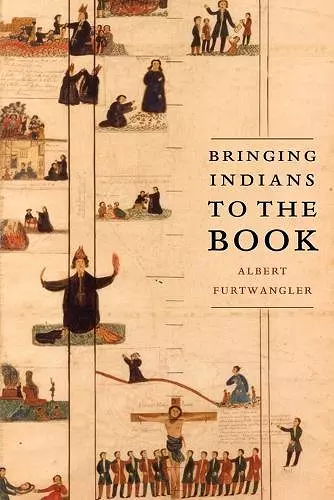Bringing Indians to the Book
Format:Paperback
Publisher:University of Washington Press
Published:22nd Jul '05
Currently unavailable, and unfortunately no date known when it will be back

Recounts the ironies and misunderstandings that arose when resolutely literate early missionaries and explorers encountered the oral societies of Northwest Coast Indians.
In 1831 a delegation of Northwest Indians reportedly made the arduous journey from the shores of the Pacific to the banks of the Missouri in order to visit the famous explorer William Clark. The story of this meeting inspired a drive to send missionaries to the Northwest. This book recounts the experiences of these missionaries.
In 1831 a delegation of Northwest Indians reportedly made the arduous journey from the shores of the Pacific to the banks of the Missouri in order to visit the famous explorer William Clark. This delegation came, however, not on civic matters but on a religious quest, hoping, or so the reports ran, to discover the truth about the white men's religion. The story of this meeting inspired a drive to send missionaries to the Northwest. Reading accounts of these souls ripe for conversion, the missionaries expected a warmer welcome than they received, and they recorded their subsequent disappointments and frustrations in their extensive journals, letters, and stories.
Bringing Indians to the Book recounts the experiences of these missionaries and of the explorers on the Lewis and Clark Expedition who preceded them. Though they differed greatly in methods and aims, missionaries and explorers shared a crucial underlying cultural characteristic: they were resolutely literate, carrying books not only in their baggage but also in their most commonplace thoughts and habits, and they came west in order to meet, and attempt to change, groups of people who for thousands of years had passed on their memories, learning, and values through words not written, but spoken or sung aloud. It was inevitable that, in this meeting of literate and oral societies, ironies and misunderstandings would abound.
A skilled writer with a keen ear for language, Albert Furtwangler traces the ways in which literacy blinded those Euro-American invaders, even as he reminds us that such bookishness is also our own.
"It may be ironic to praise in a written review a book that critiques the dominance of a culture of literacy, but so be it. This is an important work that calls into question fundamental assumptions about the nature of intercultural contact. Anyone interested in US missionary activity should take seriously its central thesis."
* Mission Studies *"This book is a fascinating essential volume for anyone interested in how the discrepant viewpoints of the early missionaries and the Indians they came to change influenced the eventual imposition of non-Indian culture on the present day Pacific Northwest."
* HistoryLink *"Bringing Indians to the Book is an engaging and original study of early missionaries in the Pacific Northwest."
* We Proceeded On: The Quarterly Magazine of the Lewis and Clark Trail Heritage Foundation *"Arguably the definitive work on its subject..[A] passionate history of ideas and people. It is an exciting and vital work that gets as near to the truth as can be imagined."
* Salem Statesman Journal *"Bringing Indians to the Book offers a thought-provoking glimpse into the minds of nineteenth-century missionaries whose writings left us only glimpses of a world they sought to change but never understood."
* Montana: The Magazine of Western History *"Albert Furtwangler tackles a complicated subject and makes it understandable and a pleasure to read. Bringing Indians to the Book provides a compelling window through which to view the first contacts that took place between whites and Indians in the Pacific Northwest."
* Journal of the West *"This book is a model for demonstrating historical research methods to students. Among Furtwangler's strengths are his persistent self-awareness and self-criticism, his digging into untapped sources, and his ability to find new meanings in old places."
* Oregon Historical QuarterISBN: 9780295985237
Dimensions: unknown
Weight: 367g
242 pages